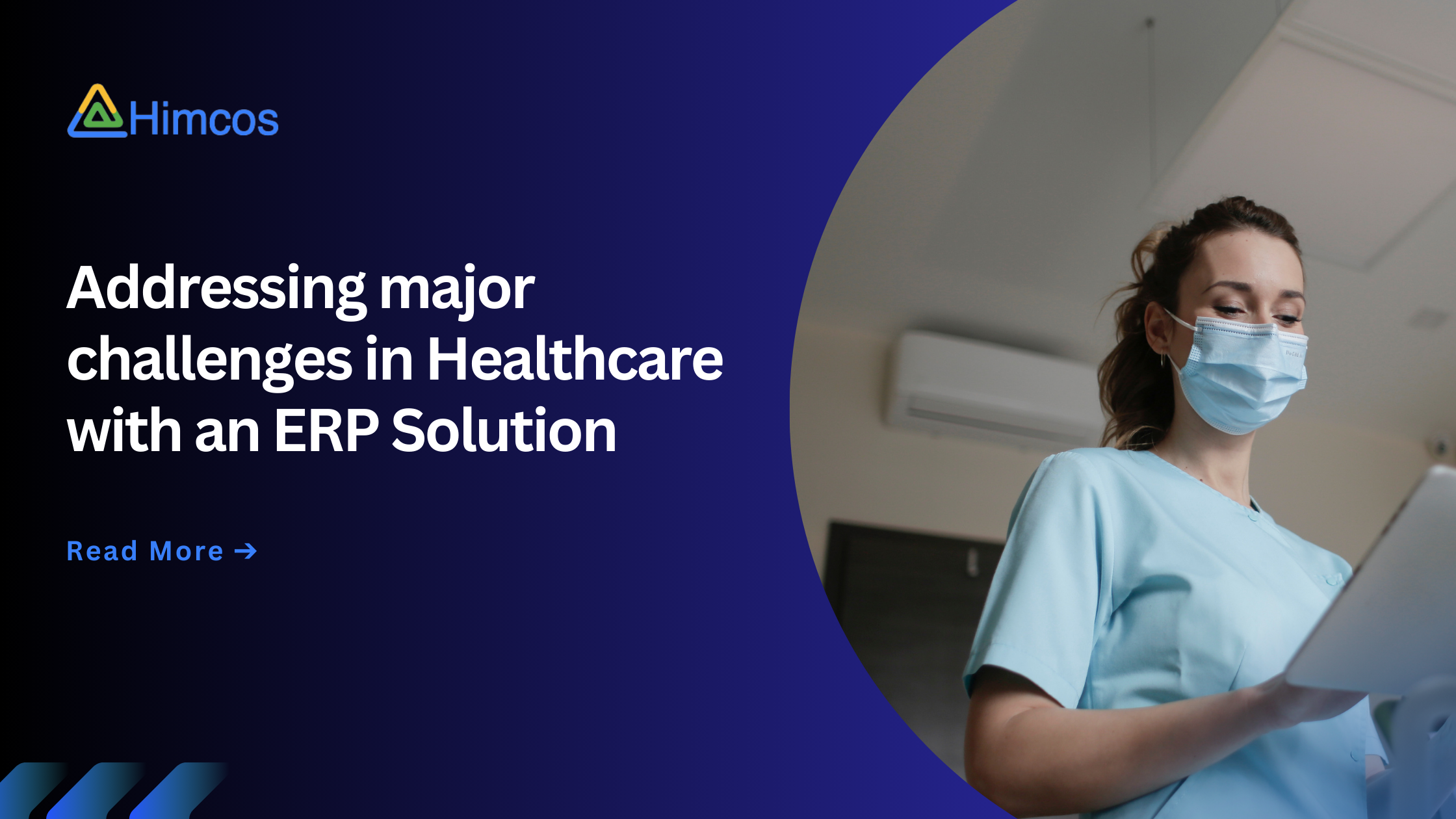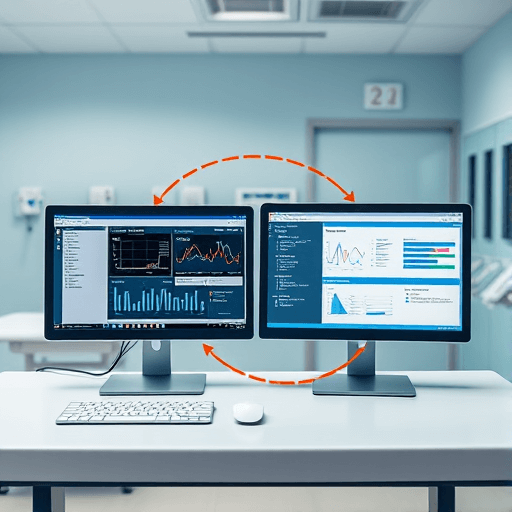Addressing Top 10 Challenges in Healthcare with an ERP Solution

There are ‘n’ number of primary issues in Healthcare that can be solved with a Healthcare ERP Solution. Expenditure in the United States healthcare reached $4.9 trillion, or $14,570 per capita, which is an increase of 7.5% from 2022. This accounts for 17.6% of the total GDP of the country. First created for industries that relied greatly on logistics and supply chains, ERP or Enterprise Resource Planning systems, aided businesses in achieving the benefits identified earlier.
As much as healthcare is about individual health, it is done in an industrial manner. A hospital and a physician’s network will procure medical devices, store them, and then distribute them to various operating theaters, examination rooms, and patients, all like a supply chain. Similarly, the logistics of patient care is also scheduled in a manner that requires provider and resource availability, procedure scheduling, and equipment reserving.
The use of ERP in healthcare is simply the logical progression of this level of sophistication. Surgeries, imaging reports, or even patients have a unique importance to the healthcare industry, and their cost does have to be controlled while using sophisticated data analysis. To enhance the efficiency of these processes, healthcare ERP solutions are developed and implemented.
Table of Contents
What is Healthcare ERP Solution?
Healthcare ERP Solution combines different processes into one system, making data management, resource allocation, and decision-making more efficient. This centralized system improves communication and teamwork, with customized solutions designed to meet industry-specific needs and boost overall efficiency.

Overcoming Healthcare headaches with an ERP Solution
From data security risks to financial inefficiencies, the healthcare industry faces numerous challenges. Many of these issues stem from outdated or disconnected systems which makes it difficult for healthcare providers to manage operations effectively. Enterprise Resource Planning (ERP) solutions integrate various processes into a unified platform, enhancing efficiency, security, and decision-making. By streamlining workflows, automating tasks, and improving data accessibility, ERP solutions enable healthcare organizations to deliver better patient care while optimizing resources. This article explores ten key challenges in healthcare and how ERP solutions can address them, ensuring a more resilient and efficient system.
1. Defending against online attacks
As online attacks become more frequent, healthcare organizations prioritize protecting patient information. Last year 66% of health systems experienced major cyber attacks that cost them $10.1 million on average. Cloud ERP solutions protect data through encryption, MFA and RBAC. These meet HIPAA standards but also protect sensitive patient info.
2. Fixing Financial Leaks
Healthcare organizations lose up to 15% of revenue due to billing errors, denied claims, and unpaid care. Cloud ERP solutions streamline revenue cycle management by automating invoicing, claims processing, and payments. With real-time financial insights, healthcare providers can quickly identify and fix revenue gaps, improving cash flow and reducing financial losses.
3. Big Data
Hospitals generate massive amounts of data—about 137 terabytes daily—but 80% of it is unstructured and hard to use. Cloud ERP systems organize and analyze this data, helping healthcare leaders make better clinical, operational, and financial decisions. With AI and machine learning, these systems can uncover hidden patterns, predict trends, and proactively address challenges.
4. Slow Clinical Workflows
Unfortunately, even with widespread implementation of electronic health record (EHR) systems, many hospitals still experience slow and inefficient workflows that create burnout among their staff. Cloud ERP solutions link with EHRs to automate manual tasks and provide real-time data accessibility. These advantages reduce administrative burden while delivering coordinated activities and increased time for patient care.

5. Workforce Management
The healthcare industry is facing a shortage of up to 124,000 doctors and 510,000 nurses by 2034. Cloud ERP solutions help address these shortages with advanced workforce management tools. They streamline hiring, onboarding, and training, track productivity, and support employee well-being—helping healthcare organizations attract, retain, and develop top talent.
6. Patient Engagement with Personalized Care
Patients expect seamless, personalized healthcare experiences. Cloud ERP solutions improve engagement with self-scheduling, patient portals, and omnichannel communication. By using AI-driven insights, providers can tailor care to individual needs, fostering patient loyalty and improving outcomes.
7. Price Transparency
New laws like the Hospital Price Transparency Rule and the No Surprises Act require healthcare providers to share clear pricing information with patients. Creating price lists and billing statements can be complex, but cloud ERP solutions simplify compliance. They also improve the patient experience by offering easy-to-understand cost estimates, personalized billing, and self-service payment options.
8. Regulatory Compliance Challenges
Healthcare is heavily regulated by compliances to make sure that the patient information remains secure and their lives aren’t at stake at any critical time. With strict regulations like HIPAA and the 21st Century Cures Act, non-compliance can lead to heavy fines. Cloud ERP solutions provide audit trails, secure storage, and automated reporting, ensuring organizations stay compliant while minimizing risk. These tools help healthcare providers focus on patient care instead of regulatory hurdles.
9. Changing Healthcare Landscape
Alternative care models like retail clinics and direct-to-consumer telehealth are reshaping the industry. Urgent care centers are growing at 7% annually, with 80% of Americans now within 10 minutes of one. To stay competitive, healthcare providers must use cloud ERP solutions for real-time data insights, optimizing resources, improving efficiency, and enhancing patient care.

10. Telehealth
The COVID-19 pandemic drove a surge in telehealth, now making up 5% of all medical claims. Mental and behavioral health services account for nearly 70% of these visits. As virtual care becomes a standard offering, cloud ERP systems help healthcare organizations manage scheduling, documentation, billing, and reimbursement efficiently, providing the flexibility needed to support telehealth services at scale.
How does Himcos help?
Himcos provides Healthcare services technology consulting and development services. By simplifying workflows for healthcare providers, we build cloud-native, AI-powered software solutions to transform clinical and financial data into actionable insights. Our platform grows alongside your healthcare institution, with features designed to expand with operations. Thousands of patients receive better care through advanced healthcare data solutions supported by tech expertise at Himcos.


